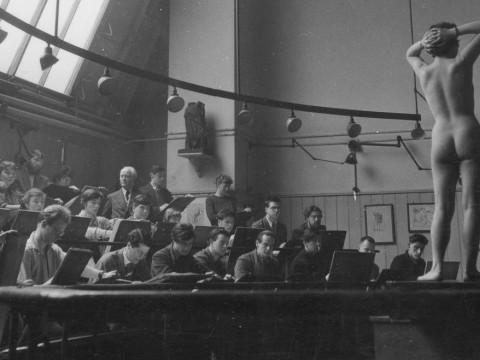
A day in the life: Molly Bretton, Access Manager
By Harriet Baker
Published on 17 March 2015
As she prepares for Dementia Awareness Week 2015, we chat to Access Manager Molly Bretton about her daily life at the RA.
In her role as Access Manager at the RA, Molly Bretton organises a range of services, events and staff training to ensure that the RA is a welcoming and accessible place for disabled visitors, their friends, families and carers. Based in the Learning Department, Molly manages a programme that includes multi-sensory workshops for children with special educational needs, private views for mobility impaired visitors, audio described gallery tours for blind and visually impaired audiences and conversation sessions in the RA Collections with people experiencing dementia.
It is a buzzing programme of events, private views, lectures and tours which means that anyone can enjoy what the RA has to offer. In the run-up to Dementia Awareness Week 2015, run nationwide by Alzheimer's Society, we catch up with Molly to find out what it is like to work at the RA.
How did you come to work at the RA?
I finished an MA in Curating at Goldsmiths and had been working for a year and a half at Shape (a disability-led arts organisation) when I saw this role advertised. Part of my job had involved working with access managers at various arts and cultural organisations in London, including my predecessor at the RA. When I heard she was leaving, I knew I had to apply and was lucky enough to be selected.
How do you start your working day?
Coffee (vital), check diary, check emails. The Learning Department is a very close-knit team, so as people arrive there’s usually some conversation (and gossip!) around recent events we may have facilitated, upcoming workshops, and what the day holds.
What does a typical day at the RA look like?
No day is the same, but a general day could involve a morning event, something like InMind, our sessions for people experiencing dementia. My assistant Sophie and I start the day preparing for the session, ensuring the artist educators and volunteers have what they need, and then we welcome attendees and oversee the event. Afterwards I might have a meeting with the Exhibitions team to discuss accessibility in relation to designs for upcoming shows. My afternoon would probably be spent researching and planning for future events, liaising with artist educators and access professionals to devise sessions, promoting events and ensuring we have enough volunteers to support each upcoming activity. I would also try and spend some time reading case studies or research about new or successful access and community programmes.
What projects have you enjoyed working on?
Sensing Spaces was particularly enjoyable for me because I was more involved with the planning stages of the exhibition than normal (each architectural work was newly commissioned for the RA). The curator Kate Goodwin was keen to have my input and it was a really positive process collaborating with her and the various architects to ensure accessibility was organically integrated into their designs.
I’m currently working with Events Coordinator Amy Bluett on a special event responding to Dementia Awareness Week 2015. We’ll be hosting a book club discussing Elizabeth is Missing by Emma Healey (which features a narrator-heroine with dementia) and a concurrent InMind session for the friends or family members of those attending the book club who are experiencing dementia.
What’s your favourite place to go for lunch nearby?
I try and bring my own lunch most days, but if I’m heading out then Kulu Kulu for sushi, Atelier for a salad or EAT for their addictive sweetcorn soup.
What exhibition have you most enjoyed?
It’s a tie between Bronze and Sensing Spaces.

Tell us something that most people don’t know about your job role.
People may not know that the UK is far more progressed in its approach to accessibility and arts programming for disabled audiences than other parts of Europe, so I have a frequent flow of international visitors meeting with me and observing our services and programmes.
What’s different about the RA compared with other places where you’ve worked?
The historical nature of the RA means it works in weird and wonderful ways – how many other organisations are governed by a body of practising artists?
What advice would you give to someone wanting to go into a career in the arts?
There are so many different jobs within the arts, but I’d say take a good look at the field you are interested in, the way it functions and the people who work there. Ask yourself if you can be happy and productive there, and what you can contribute to the field.
What are your future ambitions?
In general, I’d like to continue to learn and hopefully to effect positive change.
Read An introduction to the RA's access programme and find out about InMind and other Access events at the RA. As part of Dementia Awareness Week 2015, Emma Healey will be discussing Elizabeth is Missing, which won the Costa First Novel Award.
Find out more about Careers at the RA.
Related articles

Victorian women and the fight for arts training
2 March 2021

Eight of the best home art activities for kids
19 January 2021
Video: Antony Gormley in conversation with Iwona Blazwick
11 November 2019





